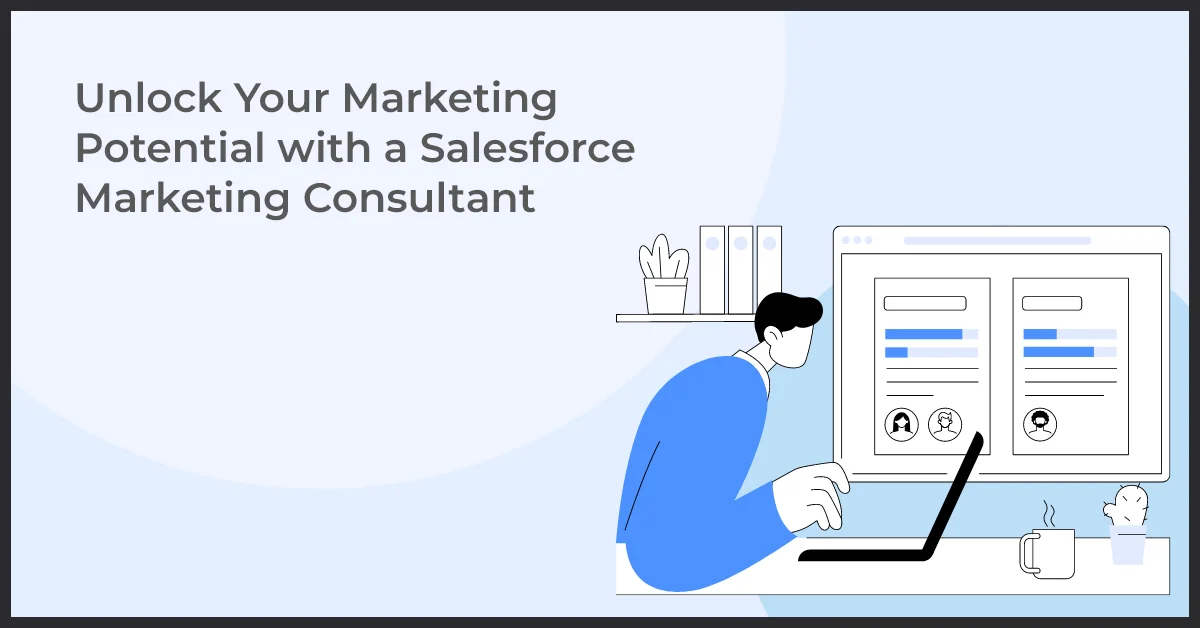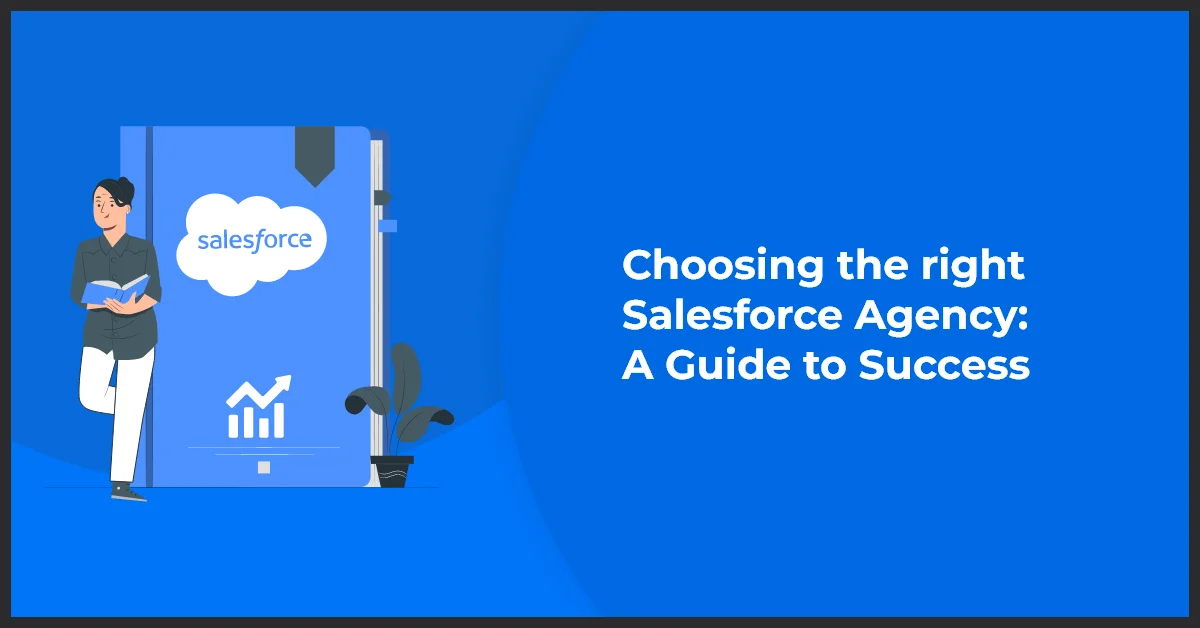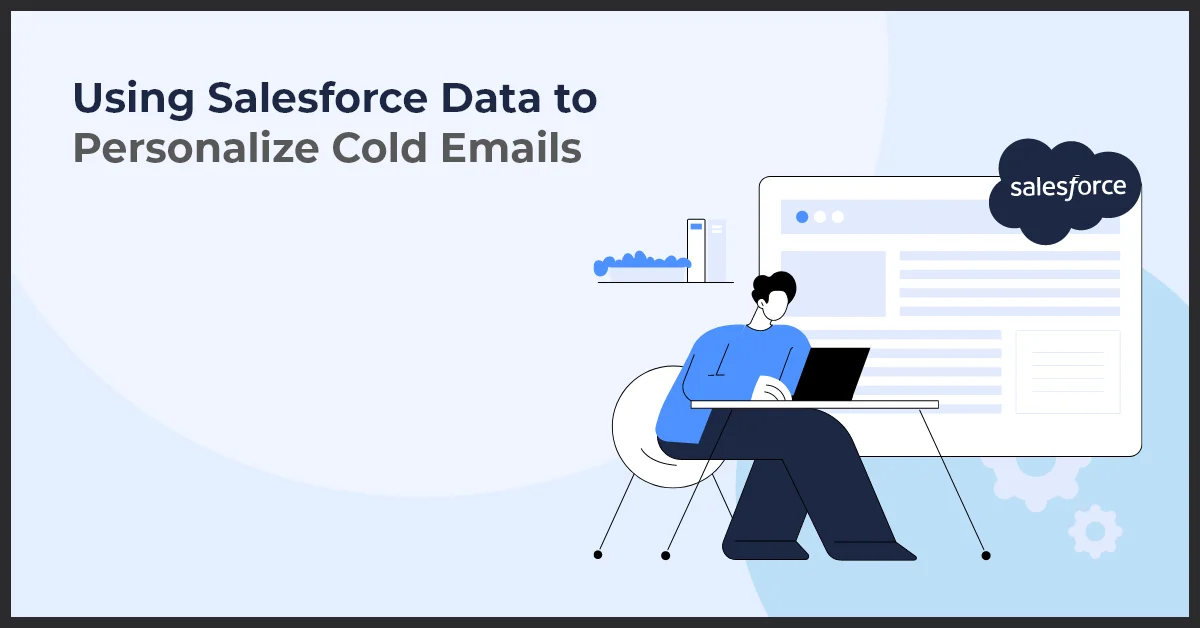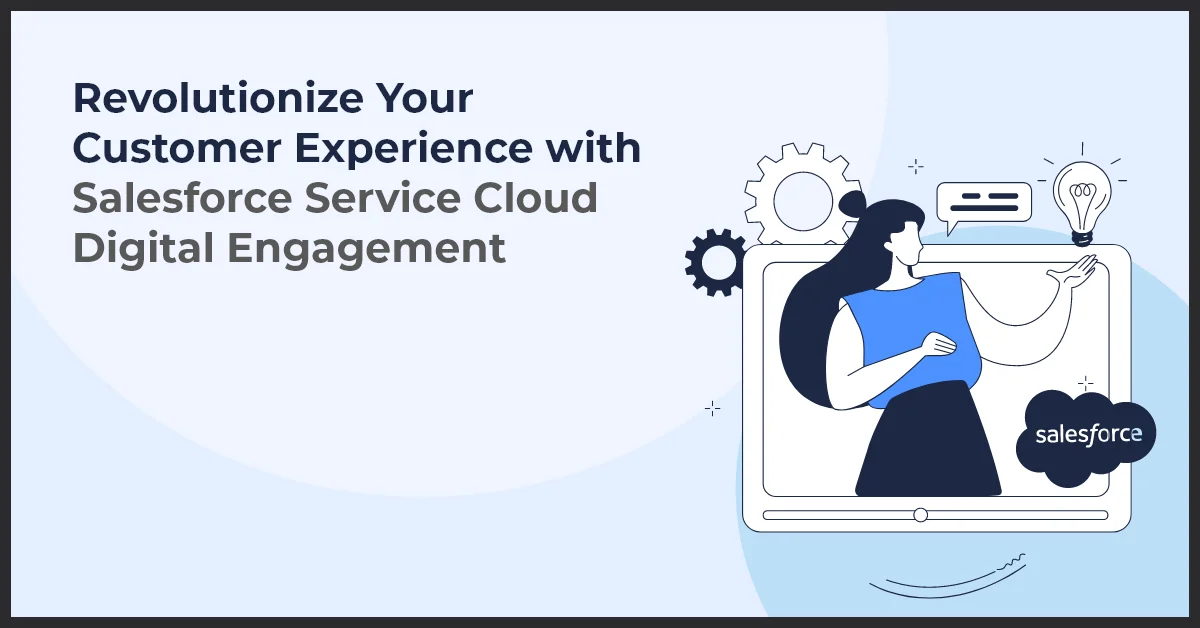Unlock Your Marketing Potential with a Salesforce Marketing Consultant

Published on: November 16, 2023
Updated on: April 09, 2024
1533 Views
- Salesforce
14 min read
What is a Salesforce Marketing Consultant?
A Salesforce Marketing Consultant is a professional who specializes in leveraging the Salesforce Marketing Cloud platform to drive successful marketing campaigns. They are responsible for providing strategic guidance and implementation support to businesses looking to optimize their marketing efforts.
1. Definition and roles of a Salesforce Marketing Consultant
A Salesforce Marketing Consultant is well-versed in the various components of Salesforce Marketing Cloud, such as email marketing, social media advertising, and customer journey mapping. Their roles include assessing marketing needs, developing tailored strategies, configuring automation tools, monitoring campaign performance, and providing valuable insights for continuous improvement.
2. Importance of hiring a Salesforce Marketing Consultant
By hiring a Salesforce Marketing Consultant, businesses can tap into their expertise to enhance their marketing efforts, reach a wider audience, and drive better results. Consultants bring in-depth knowledge and experience in utilizing Salesforce Marketing Cloud, enabling businesses to make the most out of their investment.
Benefits of working with a Salesforce Marketing Consultant
1. Expertise in leveraging Salesforce Marketing Cloud
A Salesforce Marketing Consultant is equipped with the necessary skills to fully leverage Salesforce Marketing Cloud's powerful features and functionalities. They can ensure seamless integration, effective campaign execution, and accurate data analysis, leading to improved customer engagement and conversion rates.
2. Maximizing ROI through personalized marketing strategies
One of the key benefits of working with a Salesforce Marketing Consultant is their ability to develop personalized marketing strategies tailored to each business's unique goals and target audience. By leveraging the capabilities of Salesforce Marketing Cloud, consultants can create customized experiences for customers, driving higher engagement and ultimately maximizing return on investment.
Understanding Salesforce Marketing Cloud
Overview of Salesforce Marketing Cloud
The Salesforce Marketing Cloud is a powerful suite of marketing tools and capabilities designed to help businesses create and execute highly targeted and personalized marketing campaigns. It offers a comprehensive set of features that enable marketers to reach their audience at every touchpoint, deliver relevant and engaging content, and ultimately drive customer engagement and sales.
1. Explaining the features and capabilities
The Marketing Cloud provides a wide range of features and capabilities to enhance your marketing efforts. From email marketing and customer journey mapping to social media management and advertising, it empowers marketers to create cohesive and impactful campaigns. With advanced segmentation options, campaign automation, and real-time data insights, you can deliver highly personalized and relevant experiences to your customers.
2. Importance of utilizing Marketing Cloud for effective marketing campaigns
In today's competitive business landscape, having a strong digital marketing strategy is crucial for success. The Marketing Cloud enables you to optimize your marketing campaigns by leveraging customer data, targeting specific segments, and delivering personalized content. By utilizing the Marketing Cloud, you can stay ahead of the competition and drive better results for your business.
Key components of Salesforce Marketing Cloud
The Marketing Cloud consists of several key components, each serving a unique purpose in your marketing strategy.
1. Email Studio
a. Creating and managing email campaigns
Email Studio allows you to create and manage personalized email campaigns. With its user-friendly drag-and-drop interface, you can easily design eye-catching emails, define audience segments, and automate email delivery. It also provides robust analytics to track the performance of your campaigns and optimize your email marketing efforts.
b. Personalization strategies in email marketing
Email Studio enables you to personalize your emails based on customer attributes, behavior, and preferences. By segmenting your audience and using dynamic content blocks, you can deliver tailored messages that resonate with your recipients, increasing engagement and conversions.
2. Journey Builder
a. Creating customer journeys and automated campaigns
Journey Builder allows you to map out and automate customer journeys across multiple channels. You can define different touchpoints and interactions with your audience, creating personalized experiences at every step. By automating these journeys, you can deliver timely and relevant messages to your customers, nurturing them towards conversion.
b. Leveraging automation for enhanced customer experiences
Automation plays a crucial role in enhancing customer experiences. Journey Builder enables you to automate various marketing activities, such as sending welcome emails, abandoned cart reminders, and post-purchase follow-ups. By delivering the right message at the right time, you can build strong relationships with your customers and drive loyalty.
3. Social Studio
a. Managing social media marketing campaigns
Social Studio is a comprehensive social media management tool that allows you to plan, schedule, and publish content across various social media platforms. You can monitor conversations, engage with your audience, and gain insights into social media performance. By leveraging Social Studio, you can effectively manage your social media presence and drive engagement with your brand.
b. Monitoring brand mentions and engaging with customers
Social Studio provides real-time monitoring of brand mentions, allowing you to stay on top of conversations about your brand. You can respond to customer inquiries, address issues, and engage with your audience directly on social media. By actively participating in these conversations, you can build brand credibility and foster customer loyalty.
4. Advertising Studio
a. Targeting and reaching audiences through paid advertising
Advertising Studio enables you to create targeted advertising campaigns across various online channels, such as display ads, social media ads, and search ads. You can define specific audience segments based on demographics, interests, and behaviors, ensuring your ads reach the right people at the right time. By leveraging paid advertising, you can expand your reach and drive qualified traffic to your website.
b. Integrating advertising campaigns with other Marketing Cloud components
Advertising Studio seamlessly integrates with other Marketing Cloud components, such as Email Studio and Journey Builder, allowing you to create cohesive and personalized customer experiences. By integrating your advertising campaigns with other channels, you can deliver consistent messaging and engage with your audience across multiple touchpoints.
Salesforce Marketing Consultant's Role in Data Management
Importance of data in marketing strategies
Effective marketing strategies heavily rely on accurate and relevant data. As a Salesforce Marketing Consultant, it is crucial to understand the significance of data in driving successful marketing campaigns.
1. Leveraging customer data for personalized marketing experiences
With access to customer data, a Salesforce Marketing Consultant can create personalized marketing experiences. By utilizing information such as demographics, preferences, and purchase behavior, consultants can deliver targeted messages that resonate with individual customers.
2. Utilizing data analytics for decision-making
Data analytics plays a vital role in guiding marketing decision-making processes. Salesforce Marketing Consultants use data analysis to gain insights into customer behavior, identify trends, and make informed decisions that optimize marketing strategies.
Data management best practices for a Salesforce Marketing Consultant
Ensuring data accuracy and integrity is crucial for any Salesforce Marketing Consultant. Implementing data management best practices helps maintain data quality and maximizes the effectiveness of marketing efforts.
1. Integration of customer data into Salesforce Marketing Cloud
A key responsibility of a Salesforce Marketing Consultant is integrating customer data into Salesforce Marketing Cloud. This integration ensures that the platform has access to the most up-to-date and comprehensive customer information.
2. Segmentation strategies for targeted marketing campaigns
Segmentation is a powerful strategy that allows Salesforce Marketing Consultants to divide their target audience into specific groups based on attributes or behaviors. This enables consultants to create highly targeted marketing campaigns that resonate with each segment.
3. Data cleansing and maintenance for accurate analytics and reporting
Regularly cleansing and maintaining data is essential to maintain data accuracy and integrity. Salesforce Marketing Consultants ensure that data is cleansed of duplicates, outdated information, and any errors that could impact analytics and reporting.
4. Leveraging Salesforce Marketing Cloud for Email Marketing
Email marketing is an essential component of any marketing strategy, and Salesforce Marketing Consultants play a crucial role in leveraging Salesforce Marketing Cloud's capabilities for effective email marketing campaigns.
5. Salesforce Marketing Consultant's Role in Marketing Analytics
Marketing analytics provides valuable insights into the effectiveness of marketing efforts. Salesforce Marketing Consultants analyze data from various sources to measure campaign performance, identify areas of improvement, and make data-driven recommendations.
6. Collaborating with Administrators and Customers
A Salesforce Marketing Consultant works closely with administrators and customers to understand their objectives, gather requirements, and ensure that marketing strategies align with overall organizational goals.
7. Marketing Cloud and Integration with other Salesforce Platforms
Salesforce Marketing Consultants ensure seamless integration between Marketing Cloud and other Salesforce platforms, such as Sales Cloud or Service Cloud. This integration enables a holistic view of customer interactions and helps create cohesive marketing strategies.
Leveraging Salesforce Marketing Cloud for Email Marketing
When it comes to email marketing, Salesforce Marketing Cloud is a powerful tool that can drastically improve your campaigns. With its advanced features and capabilities, you can take your email marketing efforts to the next level and achieve greater results. Here's how you can leverage Salesforce Marketing Cloud for email marketing:
Benefits of using Salesforce Marketing Cloud for email marketing
1. Advanced segmentation and personalization capabilities: Salesforce Marketing Cloud allows you to segment your audience based on various criteria such as demographics, behavior, and preferences. This enables you to send personalized and targeted emails, ensuring that your message resonates with each recipient.
2. Automation for creating, sending, and tracking emails at scale: With Salesforce Marketing Cloud, you can automate your email campaigns from start to finish. From creating personalized emails to scheduling their delivery and tracking their performance, the platform allows you to streamline and optimize your email marketing processes.
Strategies for effective email marketing campaigns
1. Designing visually appealing email templates: Visual appeal is crucial in email marketing. With Salesforce Marketing Cloud, you can create stunning and responsive email templates that capture the attention of your subscribers. The platform provides you with tools and features to customize the design and layout of your emails, ensuring a consistent and professional brand image.
2. Optimizing subject lines, CTAs, and content for higher engagement: Salesforce Marketing Cloud enables you to test and optimize various elements of your emails, including subject lines, call-to-action buttons, and content. By analyzing the performance of different variations, you can identify what resonates best with your audience and improve the effectiveness of your email campaigns.
3. Analyzing email performance and A/B testing for continuous improvement: Salesforce Marketing Cloud provides robust analytics capabilities, allowing you to measure the success of your email campaigns. By analyzing key metrics such as open rates, click-through rates, and conversions, you can gain valuable insights and make data-driven decisions to optimize your future email marketing efforts.
Salesforce Marketing Consultant's Role in Marketing Analytics
Analytics and reporting play a crucial role in understanding the effectiveness of marketing campaigns and driving data-driven strategies. As a Salesforce Marketing Consultant, it is essential to have a deep understanding of analytics and leverage it for informed decision-making.
Tracking Campaign Performance and ROI
One of the key responsibilities of a Salesforce Marketing Consultant is to track campaign performance and calculate return on investment (ROI). By analyzing data on customer interactions, lead generation, and conversion rates, consultants can assess the success of marketing initiatives and identify areas for improvement.
Identifying Trends and Optimizing Marketing Efforts
Another significant role of a Salesforce Marketing Consultant in marketing analytics is identifying trends and optimizing marketing efforts. By analyzing data on customer behavior, consultants can identify patterns, preferences, and trends. These insights enable marketers to tailor their strategies to target specific customer segments effectively.
Data Analytics Tools within Salesforce Marketing Cloud
Salesforce Marketing Cloud offers a range of data analytics tools to help consultants derive valuable insights from their marketing data.
Overview of Reporting Capabilities
Consultants can access comprehensive reports that provide detailed insights into various marketing metrics, such as email engagement, social media reach, and website traffic. These reports enable consultants to monitor key performance indicators (KPIs) and measure the success of marketing campaigns.
Utilizing Dashboards and Visualizations for Data Interpretation
Salesforce Marketing Cloud also offers customizable dashboards and visualizations that allow consultants to visualize data in a clear and intuitive manner. These visual representations make it easier to interpret complex marketing data and identify actionable insights.
Interpreting Analytics to Drive Data-driven Marketing Strategies
As a Salesforce Marketing Consultant, it is crucial to understand how to interpret analytics and translate them into data-driven marketing strategies. By analyzing customer behavior, consultants can identify the most effective channels, messaging, and targeting strategies to drive engagement and conversions.
Collaborating with Administrators and Customers
A. Effective communication with Salesforce Administrators
As a Salesforce Marketing Consultant, effective communication with Salesforce Administrators is crucial. By understanding system requirements and limitations, you can collaborate seamlessly on customizations and configurations.
- Understanding system requirements and limitations: By comprehending the specific requirements and limitations of the Salesforce Marketing Cloud system, you can effectively communicate with Administrators. This ensures that any customizations or configurations align with the platform's capabilities.
- Collaborating on customizations and configurations: By maintaining open lines of communication with Administrators, you can work together to implement customizations and configurations that meet the unique needs of your marketing strategies. This collaboration enhances the effectiveness of your Salesforce Marketing Cloud implementation.
B. Working closely with customers to understand their requirements
Aside from collaborating with Administrators, it's essential to work closely with customers as a Salesforce Marketing Consultant. By conducting stakeholder interviews and establishing regular check-ins and feedback loops, you ensure customer satisfaction by understanding their specific requirements.
- Conducting stakeholder interviews for personalized marketing strategies: By conducting stakeholder interviews, you gain valuable insights into your customers' goals, objectives, and target audience. This knowledge allows you to develop personalized marketing strategies that align with their unique requirements.
- Regular check-ins and feedback loops to ensure customer satisfaction: Establishing regular check-ins and feedback loops allows you to continuously assess the effectiveness of your marketing efforts. By seeking feedback and addressing any concerns or questions promptly, you ensure customer satisfaction and foster a strong collaborative relationship.
Marketing Cloud and Integration with other Salesforce Platforms
Exploring the integration possibilities of Marketing Cloud with other Salesforce platforms
- Salesforce Sales Cloud integration for streamlined sales and marketing alignment: By integrating Marketing Cloud with Salesforce Sales Cloud, businesses can achieve better alignment between their marketing and sales teams. This integration allows for seamless data sharing and collaboration, enabling marketers to deliver highly targeted and personalized campaigns based on real-time sales data.
- Integration with Service Cloud for cohesive customer experiences: When Marketing Cloud is integrated with Salesforce Service Cloud, organizations can provide cohesive and consistent customer experiences across all touchpoints. This integration enables customer service teams to access marketing campaign data, customer preferences, and engagement history, allowing them to deliver personalized support and resolve issues more efficiently.
Benefits of integrating Marketing Cloud with other Salesforce platforms
- Enhanced lead generation and customer nurturing processes: Integrating Marketing Cloud with other Salesforce platforms empowers businesses to have a comprehensive view of their customers and prospects. This holistic view of customer data enables advanced lead generation strategies and facilitates effective customer nurturing through personalized, targeted campaigns.
- Creating a unified and consistent brand experience across multiple touchpoints: By integrating Marketing Cloud with other Salesforce platforms, companies can ensure a unified brand experience across various touchpoints. This integration helps in maintaining consistent messaging, branding, and customer interactions, leading to increased brand loyalty and customer satisfaction.
Conclusion
In conclusion, a Salesforce Marketing Consultant plays a vital role in the success of marketing efforts. They bring expertise in data management, email marketing, marketing analytics, and collaboration with administrators and customers. By leveraging Salesforce Marketing Cloud with a consultant's expertise, businesses can maximize their marketing potential and achieve their desired results.
Throughout this content, we have discussed the importance of a Salesforce Marketing Consultant and their role in data management, email marketing, marketing analytics, collaboration, and integration with other Salesforce platforms. It is clear that their contributions are invaluable.
As businesses strive for successful marketing efforts, it is crucial to adopt the strategies discussed in this content. By partnering with a Salesforce Marketing Consultant and utilizing Salesforce Marketing Cloud, businesses can optimize their marketing strategies and achieve their goals.



